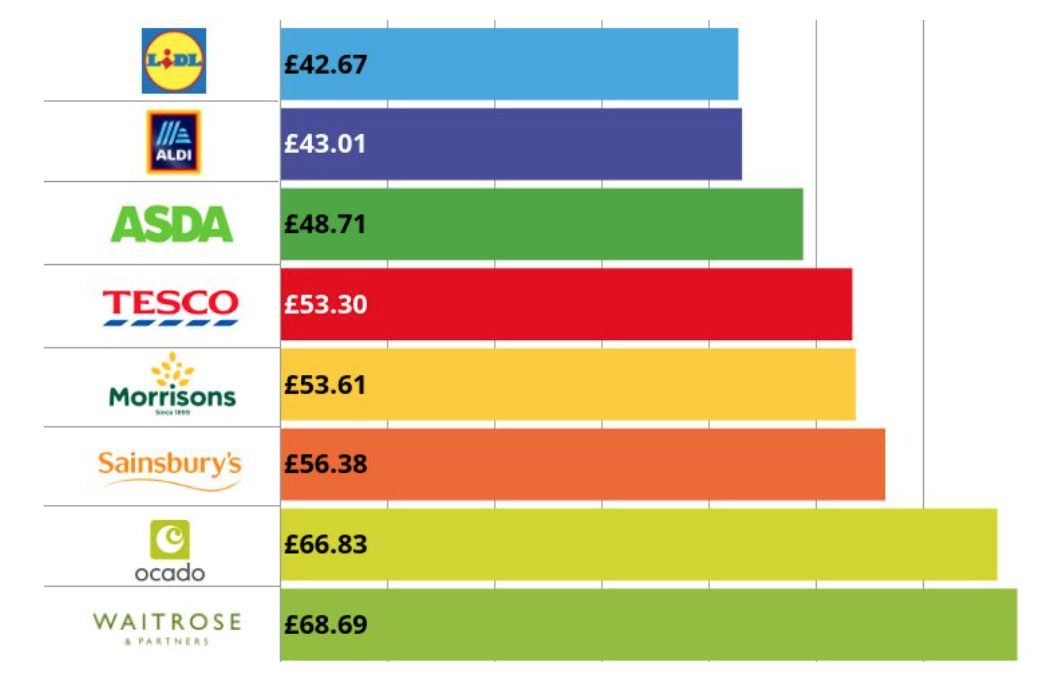The Cheapest Supermarkets in the UK 2021
Due to the various lockdowns, panic buying and stock buying to avoid frequent trips to the shops, finding the best deal has become increasingly important. A chunk of our earnings go towards our chosen supermarkets. Grocery shopping is a weekly affair to many and I’m about to break down the cheapest supermarkets here in the U.K. to help you on your journey of frugality.
Which? runs a monthly survey on the cheapest supermarkets in the U.K. for 19 essential groceries to see which store triumphs. Some of these essential goods include eggs, semi-skimmed milk, Yorkshire tea and Hovis wholemeal bread.
The latest update from February 2021 disclosed that Lidl and Aldi charged the exact same amount of £18.45 for these 19 essential groceries. Asda came in second at £20.03 (£1.58 more expensive) followed by Tesco in third place at £21.77.
Cheapest Supermarket 2020
Which? tracked the price of 45 popular branded and own-label products including Knorr stock cubes, cucumber, and free-range eggs in 8 major chains for a minimum of 100 days between January-December 2020. It then calculated the average price of each item over the year and total average cost of all 45 items whilst taking into consideration the weight and quality of items.
The following are the results of the cheapest supermarkets in 2020, ranking from cheapest to most expensive.

Lidl came in first place. It was only cheaper by 34p in comparison to its closest rival, Aldi. However, it was £26.02 cheaper than it’s most expensive competitor, Waitrose for the same trolley of items.
There is a regular price war between Aldi and Lidl, and often huge differences between the larger supermarket chains. In the grand scheme of things, both Lidl and Aldi are on par.
Why do Lidl and Aldi rank cheapest?
Which? only started including Lidl and Aldi in their monthly analysis from the second quarter of 2020.
Both Lidl and Aldi are German-owned businesses. At the heart of these German businesses is excellent strategic alignment between their commercial and supply chain strategies. This allows them to maximise their efficiency whilst balancing demand and supply more effectively.
Own Brand items
One of the reasons Aldi and Lidl top these lists is because they primarily sell housebrand items with a small supply of branded goods. Own brand items are not the same at different supermarkets. However, Which? revealed they use experts to ensure that products are as comparable as possible. Some own brand items are identical to their branded counterparts in all aspects but price. Here are some examples.
Salt
The only ingredients that go into your standard table salt are Salt (obviously) and Sodium Hexacyanoferrate II. You can choose to either pay £1.05 for 750g of salt by a brand like Saxa or a generic own brand for 27p (Sainsbury’s) for the same amount of salt.
Medication
All medications in the UK are regulated by the Medicines and Healthcare Products Regulatory Agency. Therefore, all medications available for sale have been approved as safe to use. A packet of 16 Panadol Advance paracetamol tablets cost £1.65 at Sainsbury’s, whilst Sainsbury’s own brand paracetamol costs 50p. The choice is yours!
Minimal Stocking
Aldi and Lidl were designed for minimal stocking and upkeep. Whilst stores like Sainsbury’s and Waitrose have beautiful displays, these displays are constantly restocked by employees. At Aldi and Lidl, products are stocked in boxes or are stacked on each other. This makes it easier for employees to restock, and requires less manpower to do so.
Products such as milk come in racks and produce are pre-packaged, making it an easy grab and go supermarket.
Smaller Stores
Did you know Aldi offers a selection of 900 core products and over 90% of Lidl products are own-brand items? A reduced display of national brands cut out the middleman, eliminating any additional costs from a supplier.
As a result of all of this, Aldi and Lidl have less to warehouse and display in store. They have smaller stores in comparison to most grocery retailers, and in return, pay a smaller price in rent!
Skeleton Staff
Both Lidl and Aldi run on low manpower. To limit the amount of human interaction, Lidl has efficient technology and automation in the back room. In store, customers are asked to weigh their own produce if need be and bag their own groceries.
Employees are cross-trained in order to work in any section. Therefore, staffing is flexible and efficient.
A Few to Zero Advertisements
Have you seen an advertisement for Waitrose or Tesco on your social media? Yes. Aldi or Lidl? Most likely, no. Lidl and Aldi tend to stick to local, smaller-scale marketing. With a reduced number of advertisements, these brands have more money to save for what they do best - bring you cheap prices!
I hope you find this guide useful. Whilst it’s important to find the best deals out there, you need to keep track of your financial status too. To help you keep track of them, you should download Nova now. You will be notified of not just your transactions but also your financial status as a whole. The app is aimed to improve financial habits in a fun and fulfilling way. It is the only personal finance app to reward good spending habits.
So what are you waiting for? Download Nova now to take control of your finances and let Nova push you to be the best version of yourself to achieve financial freedom.






